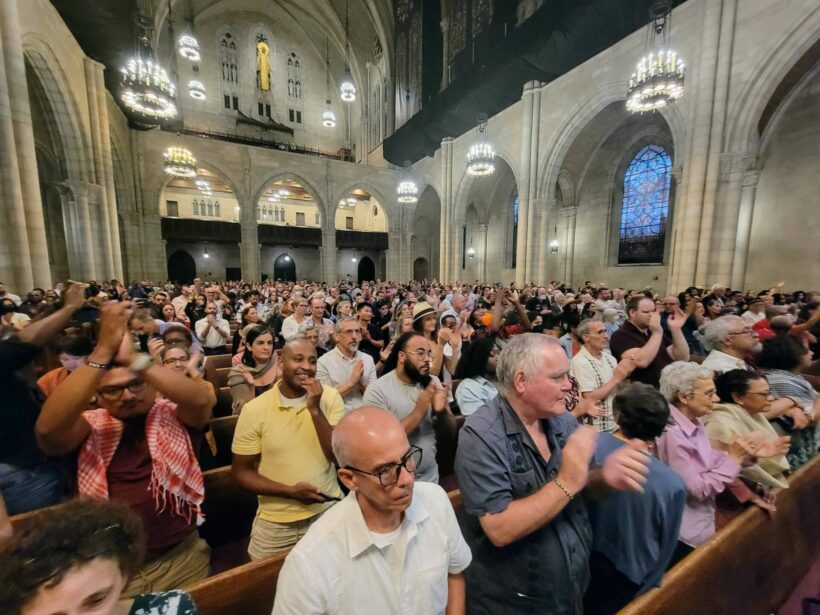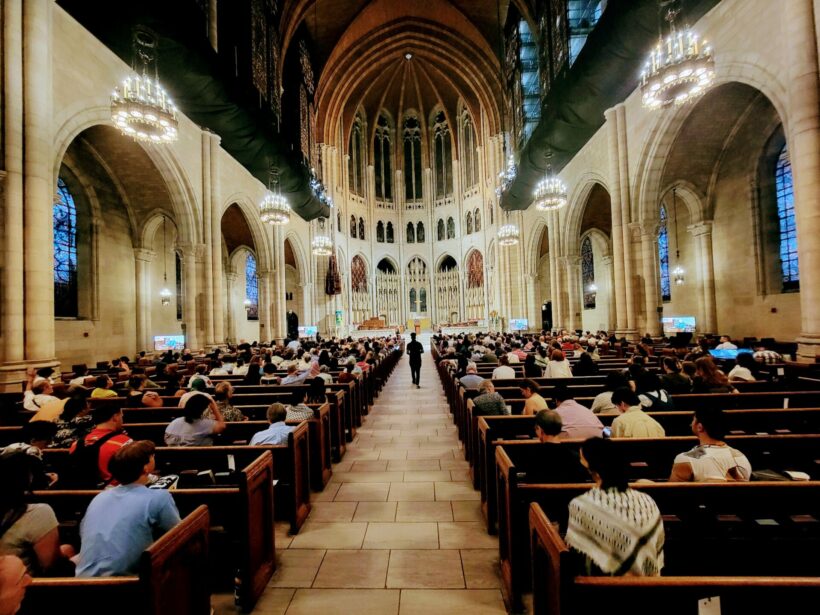On August 14, 2024, at Riverside Church in Manhattan, the Palestinian Priest of Bethlehem, Rev. Dr. Munther Isaac, delivered a powerful speech addressing the silence of American churches and the influence of Christian Zionism. A video of the event can be found here.
Two things stood out to me. First, when I registered at the press table, the Director of Communications at Riverside Church mentioned that Pressenza might be the only media outlet covering the event. (I later discovered that Al Jazeera was present.)

The second surprise was the turnout: the church was nearly full, with a capacity of 2,100. The organizers credited Rev. Dr. Isaac’s interview on Democracy Now that morning for the strong attendance. You can watch a clip from that interview here.
This highlighted a disturbing reality: mainstream America remains indifferent to the plight of Palestine, while the efforts of well-meaning people worldwide have yet to bring about meaningful change. As peace activists, we must ask ourselves: are we merely seeking to appease our own consciences?
A different strategy is urgently needed. We could learn from what recently happened in Bangladesh. Starting on August 3rd, and within a week, students successfully unseated Bangladesh’s longest-serving prime minister, Sheikh Hasina. They managed to paralyze the country, including the Ready-Made Garment factories, a $31.46 billion industry.
We need to draw inspiration from this level of action. It’s no longer about merely protesting or calling for a ceasefire. We must aim to bring the system to a halt—no going back to school, no transportation, no banks, no stock market, no weapons shipments, no internet, no entertainment, no airports.
Without the actions of the U.S., Wall Street, and London, there might be no war in Ukraine and Russia, no genocide in Palestine, no imminent conflict with China and Iran, no sanctions on Venezuela, Cuba, and others, and no severe threat of nuclear conflict that could destroy the world as we know it. These powers prioritize war over addressing climate change and environmental degradation, leaving millions at immediate risk from floods, fires, pollution, tornadoes, hurricanes, and food and housing insecurity.
We need to shut down New York City, London, and Washington, D.C.
We must coordinate concentrated nonviolent actions with a clear strategy, pushing the system to the brink, forcing it to reveal its violence and make mistakes—just as happened in Bangladesh a few weeks ago. For any revolution to succeed, the security forces and political elites must “lose their nerve.”
No more diplomacy. No more begging for favors—we are no longer slaves asking our masters for anything. This is not about politics, left versus right, Democrats versus Republicans. This is about ending wars, genocide, nuclear weapons, colonialism, and the 1% versus the 99%. This is not about the November U.S. elections but about a broader movement.
We can learn from Gandhi’s Satyagraha movement in India, from Nelson Mandela and Desmond Tutu in South Africa, from Martin Luther King Jr. and the Civil Rights Movement in the U.S., from the Arab Spring in Tunisia, and now, from the student movement in Bangladesh. Protests and disruptions happen every day; we just need to synchronize the power of nonviolence toward a clear objective where everyone can contribute.
We must humanize the people and shut down this system.










